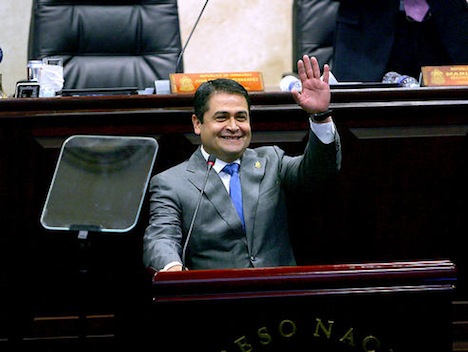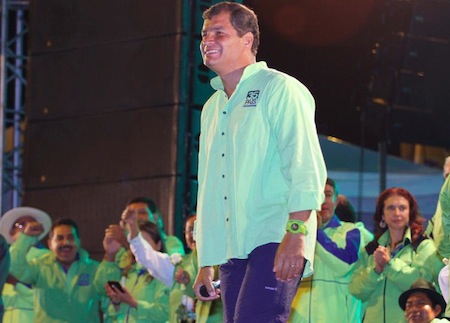Even as Xiomara Castro de Zelaya continues to dispute the victory of center-right rival Juan Orlando Hernández in last month’s presidential election, the Honduran electoral commission released the final results of the parliamentary elections that were also conducted on November 24.![]()
As expected, no single party won a majority in the 128-member, unicameral Congreso Nacional (National Congress).
That means when Hernández is inaugurated as Honduras’s next president, he will do so with less power than he had as president of the National Congress over the past four years. With just 48 deputies, his center-right Partido National (PN, National Party) will return to the National Congress not only without a majority, but with 23 fewer seats than in the previous Congress, during which the National Party controlled both the National Congress and the presidency under outgoing president Porfirio Lobo Sosa.
Since the return of regular democratic elections in 1981, each of Honduras’s presidents has also held a majority (or near-majority) in the National Congress, so there’s not a lot of precedent for coalition government to which its leaders can now turn. Despite the novelty of coalition politics in Honduras, however, it’s about to become a vital component.
Though Castro de Zelaya (and her husband, former president Manuel Zelaya) might be disappointed by her apparent 8% loss to Hernández, they should be buoyed by the success of their party, the Partido Libertad y Refundación (LIBRE, Party of Liberty and Refoundation), in the parliamentary elections. By winning 37 seats in the National Congress, LIBRE has prevented any single party from winning an outright majority, a radical change to modern Honduran politics. Although Zelaya and other left-wing activists founded LIBRE only in June 2011, taking with them many of Zelaya’s supporters in the traditionally center-left Partido Liberal (PL, Liberal Party), it has now displaced the Liberal Party as the second-strongest force in the National Congress.
That leaves the Zelayas with a choice. They can continue a path of resistance against an election that they argue was fraudulent (less in terms of ballot fraud and more in terms of fundamental unfairness in the environment of danger and fear for LIBRE candidates). By doing so, however, the Zelayas risk losing popular support in the same way that Andrés Manuel López Obrador gradually lost steam in his protests against the 2006 Mexican election results, and the Zelayas risk alienating LIBRE from the other main political parties. Or they can take up the mantle of Honduras’s chief democratic opposition from their relatively strong perch in the National Congress, where Zelaya (the former president) will now hold a congressional seat.
The first test will come when the National Congress elects its new president, and Hernández will almost certainly want to marshal enough support to install one of his top congressional lieutenants, former security minister Oscar Álvarez, Lena Gutiérrez or Rigoberto Chang Castillo, as his successor. Continue reading Results of the Honduran parliamentary election — a gridlocked National Congress


